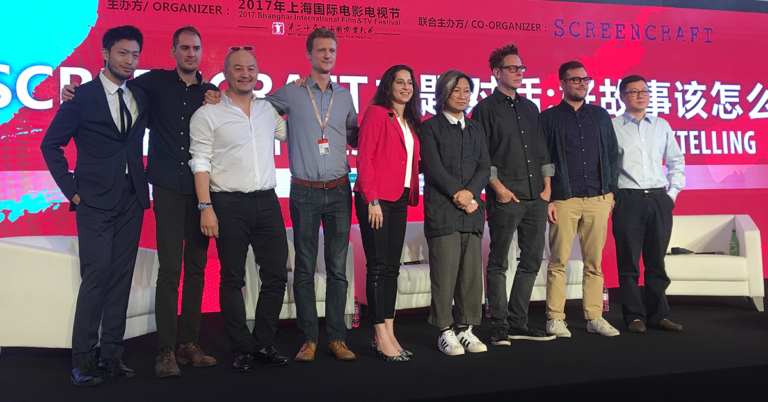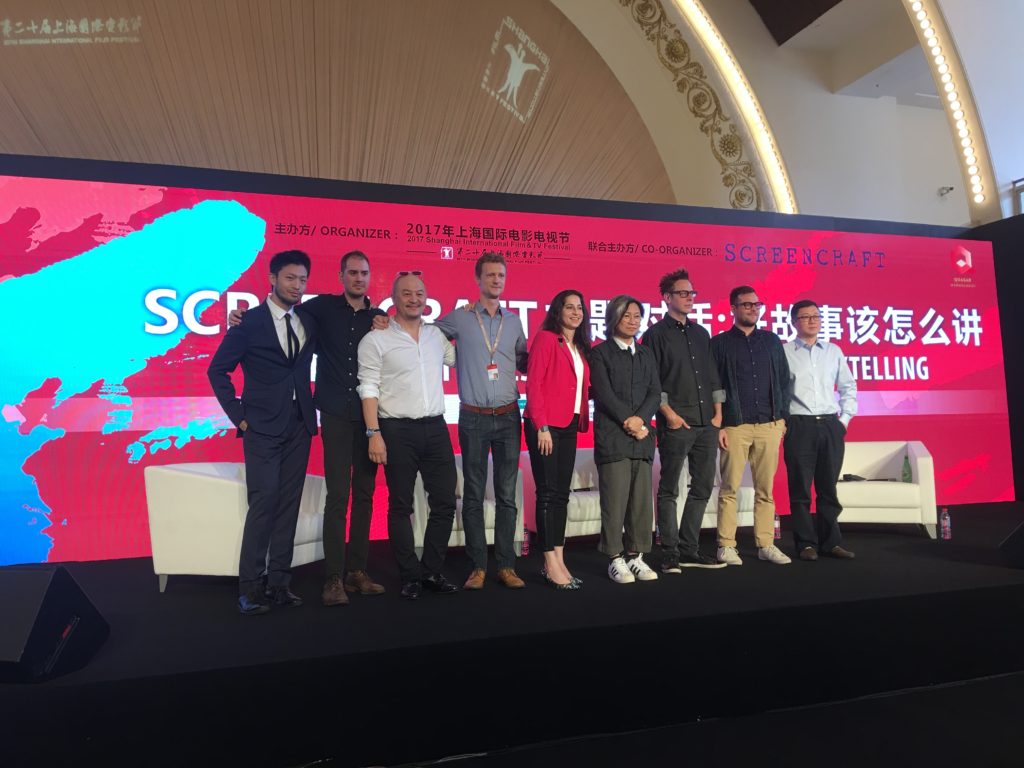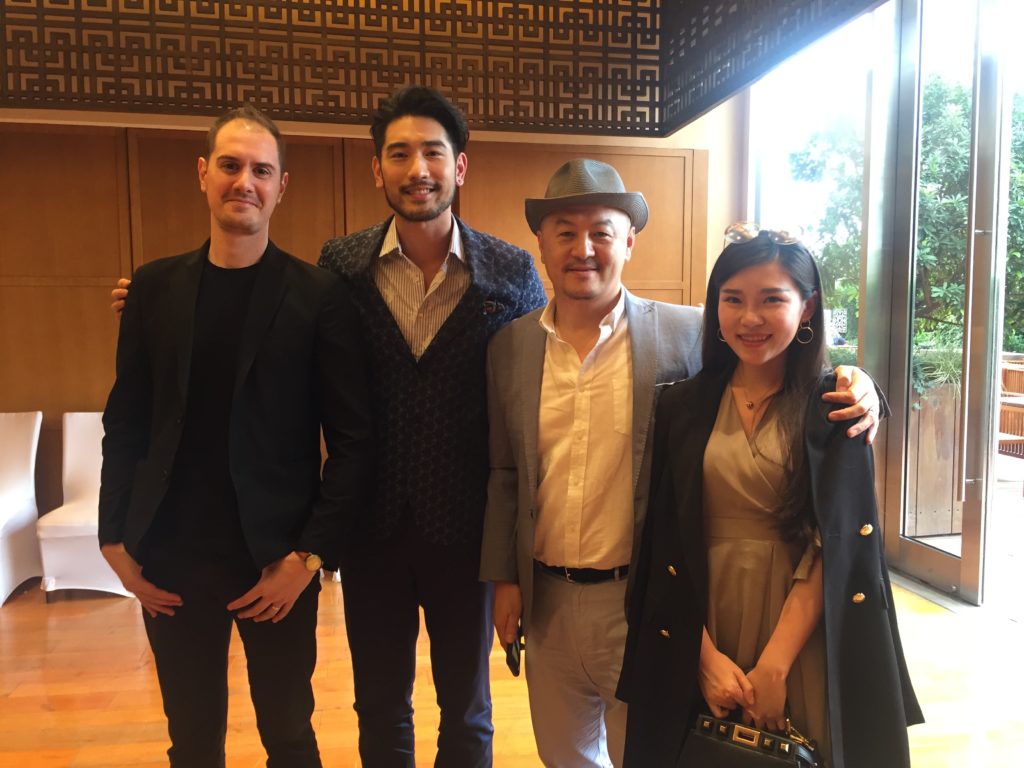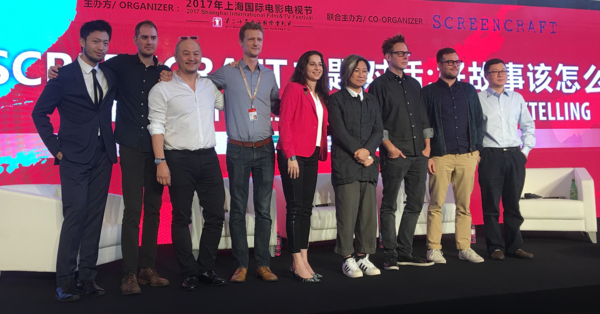China is the Future: Why Screenwriters Should Diversify

Year after year the Chinese box office continues to grow at breakneck speed, with shifts in audience tastes and policy seeming to happen almost overnight at times. This dynamic space has attracted filmmakers and financiers alike, but has not been without its fair share of bumps in the road. Despite the ups and downs, this growth has still paved the way for various cross-border opportunities and continues to pose challenges for how Hollywood and China could shape a new global cinematic paradigm and forge new business models.
As China is to play an increasing role in shaping this new path forward, we invited Orb Media Group founder Peter Shiao, along with two 2017 ScreenCraft China-Hollywood Fellowship winners, Patrick Biesemans and Marcus Sun, to discuss their perspectives. As the producer of the first-ever US-China coproduction and founder of the US-China Film Summit, Shiao has seen how both industries have developed over the past two decades.
Fellow Patrick Biesemans directed his first feature The Last Treasure Hunt in 2016, along with various award-winning shorts that he both wrote and directed. His entry The Beautiful Country is currently moving toward a late 2018 production window and will be produced by Orb Media Group.
Marcus Sun wrote the script for mainland animation film Hotpot last year and is working on an adaptation of the Chronicles of the Immortal Swordsmen, a major Chinese language feature film with a fellowship affiliated production company, Immortal Studios. Both have seen their projects and careers advance as a result of the 2017 ScreenCraft China-Hollywood Fellowship.
ScreenCraft and Orb Media Group on stage in Shanghai with Guardians of the Galaxy writer-director James Gunn:

On stage in Shanghai with Marcus Sun, Patrick Biesemans, Peter Shiao, John Rhodes, Emily Dell, Peter Chan, James Gunn, Max Borenstein and Raymond Zhou.
The Interview
For anyone who isn't aware of how great the film industry in China is, what would you say are the most important things they should know about it?
Peter Shiao: I wouldn't say that the Chinese film industry is great — yet — in the qualitative sense, but it is getting better every year and it is certainly the fastest growing and by sheer size largest market in the world. That alone is significant enough. Furthermore, because of its momentum and size, and relatively new status, what is unique is that it is not as tethered to the "old way" creatively and technologically of doing things. It also has a zeal for talent and, for those who choose to work within its accepted parameters, a real opportunity to get things done.
The other thing I want people to know is that the streets are not paved with gold, and money does not grow on trees. The real and significant opportunities in this market will only ultimately open to those who are willing and able to commit and to make it a vocation and advocation.
The box office numbers have been outstanding! What do you think the future looks like?
Peter Shiao: In addition to the continuation of the growth, I expect to see China as a hub for cross-media and transmedia innovation as well as new business models. There will be a lot more collaboration between Hollywood and China on all levels that will give rise to a new mainstream of companies and talent who can seamlessly appeal to both markets. This is what our fellowship is about - identifying, supporting and launching them!
“...this market will only ultimately open to those who are willing
and able to commit, and to make it a vocation and advocation.”
- Peter Shiao
Do you see the fellowship as an opportunity to discover and foster talent in the long term? Or do you see it as more of a way to help out fellows in the short term, just enough to help launch their careers?
Peter Shiao: To me, it is both. Because we are engaged in the fellowship long term, for the individual fellows it is a chance to launch their cross-border film careers, but in the aggregate and as we move onto future years, we are participating in long-term talent development.
How has your project improved as a result of being a fellow?
Patrick Biesemans: It’s instrumental to the development process, listening to the perspective of collaborators. Tying some of the strings that would have been left dangling has certainly improved the script.
Marcus Sun: It’s definitely gotten more attention. It’s funny, there are so many people who want to get into movies, but they’ve got all of the money and none of the confidence. Most of them come from finance background where it’s all about objectivism. How objectively good is this thing? How do we measure it? That’s where most of them run into a brick wall when appraising scripts because there’s no actual objective way to measure if a script is “good”. So when a script is a “contest winner” or a “fellow”, it automatically gets a leg up in the objectivism category.
How has the process been so far? What have you learned about development and screenwriting whilst being a fellow?
Marcus Sun: It’s been a much longer haul than I anticipated. Of course, there’s always room for improvement, but there are so many metrics by which to measure a script. I’m actually starting to think that the first obstacle to any film project is simply sticking with the development process long enough to see some kind of result. It’s so easy to give up.
How do you feel about some of the restrictions that China places on screenwriters and filmmakers? Is it true you can't have time travel or ghosts involved? What other things, that are huge in Hollywood, just won't fly in China? Do you think this will ever change?
Peter Shiao: Government regulation is a fact of life in China and something that we don't expect sudden change on, but incremental adjustments. But it is also not a black or white affair. In practice, there is a lot of give-and-take involved in pushing the boundaries and as a company, we are very committed to doing just that.
Patrick Biesemans: Overall, besides enjoying the company of filmmakers with unique points of view, I think a highlight of this trip was understanding the way the Chinese film market works. The expectations involved in tackling something of this nature and of this size.
What makes you personally so passionate about film and bridging the China-Hollywood gap?
Peter Shiao: What really excites me is the social impact of these types of collaborations whereby East-West stories can help unite and bring more understanding to the world. I am a huge fan of a Chinese word for content: spiritual food. So more spiritual food for the world through East-West collaborations.

Godfrey Gao, Patrick Biesemans, Peter Shiao and Special Guest.
Why did you decide to submit to the screenwriting fellowship?
Patrick Biesemans: Plainly, I was tired of not seeing enough opportunities for Asian Americans, in particular, Chinese talent. I thought I’d write something that couldn’t be whitewashed no matter which way you scrubbed. The fellowship seemed like the right fit for the story I was trying tell.
Why do you think your project stood out?
Patrick Biesemans: It’s original, outside of it being an opportunity for Chinese actors; it focuses on a group of people and a moment in time, in American history, that is usually relegated to background noise. I took that noise and made it the focal point of the story.
How did you enter into the world of filmmaking?
Marcus Sun: The short answer is I went to school for it. The long answer is I’ve always wanted to tell stories. It’s an obsession I got from my grandmother and I’ve been pursuing a way to do it for my whole life. I was fortunate enough to meet a confluence of circumstances that allowed me to meet a lot of people who were already in the industry and gave me the opportunity to show them that I wanted to tell stories. I took every job that came my way. I’ve been a production assistant on set, I’ve been an assistant at the office, I’ve been assistants to actors and producers alike. I translated, which probably played best to my native strengths, and that allowed me to read a lot of scripts and interact with a lot of creative people. Throughout this whole process, I’ve been learning and writing. The latter of which is, thankfully, a zero-budget activity in an industry that requires a lot of capital to do anything.
Patrick Biesemans: I jumped headfirst into filmmaking after a frustrating stretch in editorial and advertising work. I was tired of giving my creativity away to things that just didn’t fit. Writing my own feature work, to later direct, seemed like the appropriate progression.
Do you have any tips or advice to help future fellows navigate the process?
Patrick Biesemans: Write from your heart about what you love and hate about the world. Have honest conversations about it with anyone who will listen. Ask advice from everyone (mom included). Get criticized in lethal amounts. Listen to everyone, then shut the door and don’t listen at all — go back to writing from your heart.
For all the latest ScreenCraft news and updates, follow us on Twitter, Instagram and Facebook.
Tags
Get Our Screenwriting Newsletter!
Get weekly writing inspiration delivered to your inbox - including industry news, popular articles, and more!



























